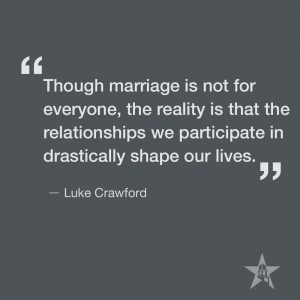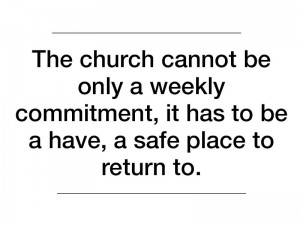Over Thanksgiving break I went to see the third movie of The Hunger Games series, of which I have read all three books. Since then, multiple people have asked me if I liked it, and each time I have had trouble answering. Did I like it? I don’t think so; but I don’t think this series was meant to be enjoyed.
 It’s not that the cinematography was bad or the acting was poor, but it’s disturbing to see the parallels between the dystopian society imagined by the author of The Hunger Games, Suzanne Collins, and the world we live in. And surely this is, at least in part, the point of the series. However, what’s more disturbing is the number of people I hear talking about how much they like the series. I’m not saying that it’s necessarily wrong for someone to like it, but we need to at least understand that it is more than entertainment. It is revelatory.
It’s not that the cinematography was bad or the acting was poor, but it’s disturbing to see the parallels between the dystopian society imagined by the author of The Hunger Games, Suzanne Collins, and the world we live in. And surely this is, at least in part, the point of the series. However, what’s more disturbing is the number of people I hear talking about how much they like the series. I’m not saying that it’s necessarily wrong for someone to like it, but we need to at least understand that it is more than entertainment. It is revelatory.
If you’re not convinced this is true, look to Thailand. Following the military coup in May, people began to use the three-fingered salute from The Hunger Games as an act of resistance to the new military-run government. This led to multiple arrests. People living in the systems of our world can relate to this story of a totalitarian empire that sends children into the “Hunger Games” where only one can come out victorious, only one survives — these games held to display government power. This is scary.
There are many disheartening parallels to be found between the nation of Panem in The Hunger Games, the nation we live in, and all the powers and principalities of this world. But this is not the only evil exposed by this series. Though, it is the easiest to see. In fact, the larger wrongdoing revealed, the one I think we would do good to uncover, may be the very reason that it is easiest to see the evil of the government.
So what is this subtle evil? Violence. The will of the crowd. The most disturbing part of reading this series was witnessing my own passion to bring about justice by the way of violence catch fire, so to speak.
 Let me say that I am thankful to be an American. However, I was ready to throw the first stone at my nation upon reading these books, but I am now realizing that, sadly, I have both benefited from the brokenness of the system and contributed to it. I certainly have no right to violence; and as Brian Zhand points out in his book A Farewell to Mars, we often think this is what freedom is: a right to violence. He goes on in this book to say that “violence cannot tolerate the presence of one who owes it nothing.” This is a hard truth. We either put ourselves at risk of being stoned or we join in the stoning. No other options exist.
Let me say that I am thankful to be an American. However, I was ready to throw the first stone at my nation upon reading these books, but I am now realizing that, sadly, I have both benefited from the brokenness of the system and contributed to it. I certainly have no right to violence; and as Brian Zhand points out in his book A Farewell to Mars, we often think this is what freedom is: a right to violence. He goes on in this book to say that “violence cannot tolerate the presence of one who owes it nothing.” This is a hard truth. We either put ourselves at risk of being stoned or we join in the stoning. No other options exist.
In The Hunger Games, the resistance to the government is formed behind the image of a warrior, a victor, a “courageous” killer, Katniss Everdeen and her three-finger salute. This symbol brings the people of Panem together against the Capitol. The Jews would have much preferred Katniss Everdeen riding in her flaming chariot to Jesus riding on a donkey. Surely, they would not have killed her.
In the series, you see Katniss struggling with the symbol she has become. She is unsure of whether she should continue in her role as the incarnate representation of this resistance movement. In some ways she wants to be more like Jesus and his way of peace. Yet, she cannot overcome the need the mass has for her as a symbol of retaliation, and the systemic “necessitation” of violence.
As Christians we have a different symbol to unite behind, the only symbol that can unite people in peace. That is Jesus Christ, the Prince of Peace. Through his death on the cross he has exposed the inherent evil of the violent systems of the world, the systems that put him on the cross. I think, if we are attentive to the revelatory nature of The Hunger Games series, we might be able to see how they also shine light on these evils. May we not worry about whether the odds are ever in our favor, but instead always choose to follow Christ down the path of peace and peacemaking.



